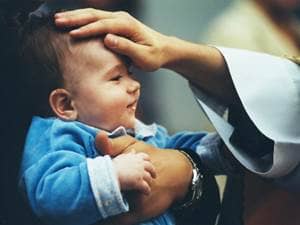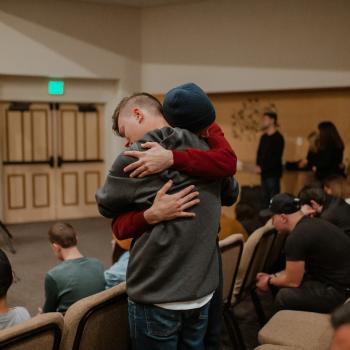
Baptism is seen as an essential rite of faith in most Christian denominations. This ritual involves using water to symbolically purify and cleanse a person of sin and join him or her to the church, the family of God and the body of Christ. It is often viewed as a sign that a person is wholeheartedly committed to following Christ.
As baptism is seen as evidence that a person is dedicated to living a Christian life, some denominations insist that a person needs to be older before they can be baptized. They teach that children are not yet mature enough to commit to following Christ of their own volition. Instead, members of the church are baptized as adults or teenagers who are mature enough to make their own decisions about their spiritual life and soul. Many of these same denominations practice immersion. Immersion is a form of baptism where the individual is submerged entirely in water. Some church buildings include a large baptismal tank where this immersion is possible; other churches use a nearby lake, river, or swimming pool.
Certain Protestant denominations, such as the Pentecostal, Baptist, Church of God, and Anabaptist churches practice only adult and immersion baptism. Other Christian denominations, both Protestant and Roman Catholic, will baptize both adults and infants and young children. These churches usually sprinkle water or gently pour water over the candidate’s head rather than immerse him or her.
Infant baptism has a long history in the Christian church. The earliest Christians would almost all have been baptized as adults because the first Christians were all Jewish or Gentile converts. Over centuries, the church became increasingly mainstream and even powerful, and baptism, which brought church membership, afforded political and economic opportunities. Parents were eager for their children to belong to the community, both religious and secular. In presenting their children to the church for baptism, the parents and godparents would commit themselves to raising the child in Christian faith. Besides the secular recognition, baptism assured parents that their children had been cleansed from sin and, if they died before they could claim their own faith, they would be saved.
For many centuries, the church taught that baptism was essential for salvation and that an unbaptized child would not be saved. As the odds of any child living long enough to reach adulthood or even adolescence were depressingly low, infant baptism became an essential act for parents who wished to save their children’s souls. As such, infants were baptized almost as soon as they were born so that they could reach heaven if they were one of the many that died during childhood. Today most Christians accept that infants and young children will receive the mercy of God, whether or not they’ve been baptized.
Infant baptism also served a second purpose. It was during baptism that the child was officially named and introduced to its family and church community. This practice was called a christening and still survives today. While the vast majority of children already have a name when they are brought to their christening, some denominations give children another name during their christening and name a second set of parents, called godparents, who are meant to help guide the child through their Christian faith and take over for the parents should anything happen to them.
Presbyterians, Lutherans, and Reformed Christians also baptize infants. Read about their thoughts on this here.
3/23/2021 6:32:40 PM










